Zohran Mamdani NYC Mayor 2025: Democratic Socialist’s Historic Rise to Power
Mamdani’s journey from Ugandan-born child of famous parents to mayoral frontrunner represents one of the most remarkable political ascents in recent American history. His candidacy has ignited fierce debates about democratic socialism, housing policy, Israel-Palestine, and the future direction of urban governance. Supporters see him as a refreshing voice who centers working-class concerns in an age of crushing inequality. Critics view him as an inexperienced ideologue whose policies would devastate the city’s economy and housing market. Understanding Mamdani requires examining his privileged yet politically conscious upbringing, his rapid rise through New York politics, and the substantive policy debates his candidacy has sparked.
Zohran Mamdani’s Early Life: From Uganda to New York City Politics
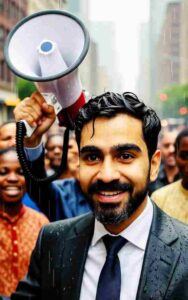
Zohran Kwame Mamdani was born on October 18, 1991, in Kampala, Uganda, the only child of two towering figures in their respective fields: Mahmood Mamdani, a renowned scholar of colonialism and African politics, and Mira Nair, an Oscar-nominated filmmaker known for movies like “Monsoon Wedding” and “Salaam Bombay!” His middle name, Kwame, was chosen by his father to honor Kwame Nkrumah, Ghana’s revolutionary first president—an early indication of the political consciousness that would permeate his upbringing.
Both of Mamdani’s parents are of Indian descent, part of the vast Indian diaspora in East Africa. His father, a Gujarati Muslim, was born in Bombay but raised primarily in Uganda before being expelled by dictator Idi Amin in 1972 due to his ethnicity. His mother, a Punjabi Hindu born in Rourkela and raised in Bhubaneswar, India, would later become one of Indian cinema’s most celebrated international directors. The couple met in Uganda while Nair was conducting research for her film “Mississippi Masala,” and their marriage brought together two intellectual and creative powerhouses.
Mamdani’s early childhood in Kampala was brief but formative. When he was five, the family moved to Cape Town, South Africa, where his father taught African studies at the University of Cape Town. Two years later, at age seven, they relocated to New York City, where Mamdani would spend most of his formative years. The family settled in Manhattan, and young Zohran attended the Bank Street School before later enrolling at the prestigious Bronx High School of Science.
The Mamdani household was anything but typical. In a 2013 interview with the Hindustan Times, Mira Nair described her son’s cultural identity in stark terms: “He is a total desi. Completely. We are not firangs at all. He is very much us. He is not an Uhmericcan (American) at all. He was born in Uganda, raised between India and America. He is at home in many places. He thinks of himself as a Ugandan and as an Indian.” She emphasized that “we only speak Hindustani at home” and described her son as a “very chaalu fellow”—a Hindi term meaning savvy or street smart, though it can carry connotations of someone who knows how to work the system.
These comments, which resurfaced during his mayoral campaign, sparked controversy about Mamdani’s relationship with American identity. Critics seized on his mother’s characterization to question his loyalties, while supporters argued that his multicultural background enriched his perspective on a diverse city. Mamdani would later become a naturalized U.S. citizen in 2018, obtaining dual citizenship with Uganda.
Growing up in post-9/11 New York City proved formative for the young Mamdani. In interviews, Mira Nair has described how the family—including Mamdani’s paternal grandparents, who lived with them—experienced subtle but unmistakable shifts in how they were perceived. “We would all take walks every evening,” Nair recalled, “and there was a feeling that we were being looked at askance, that there was suddenly this home and amazing place that didn’t feel like home anymore.” This experience of being othered in America, combined with his parents’ scholarly and artistic focus on colonialism and diaspora communities, shaped Mamdani’s political consciousness from an early age.
Bowdoin College Years: Palestine Activism and Democratic Socialist Awakening

At the Bronx High School of Science, Mamdani displayed the organizational skills and multicultural interests that would later define his political career. He co-founded the school’s first-ever cricket team, which went on to participate in the Public School Athletic League’s inaugural cricket season. He also played soccer with the West Side Soccer League. Though he unsuccessfully ran for student body vice president, the experience of organizing and campaigning stayed with him.
Mamdani’s political awakening truly began at Bowdoin College in Brunswick, Maine, where he enrolled in 2010 to study Africana Studies. It was here that he co-founded the college’s Students for Justice in Palestine chapter, marking the beginning of a lifelong commitment to Palestinian rights that would become central to his political identity. In a 2014 op-ed in Bowdoin’s student newspaper, Mamdani argued for the college to join the Boycott, Divestment, and Sanctions (BDS) movement against Israel, writing that the boycott aimed to “put pressure on Israeli institutions to end the oppressive occupation and racist policies within both Israel and occupied Palestine.”
Mamdani’s views on Palestine were heavily influenced by his father’s scholarship. Mahmood Mamdani had long been critical of Israel, arguing in a 2014 speech that “Jews can have a homeland in historic Palestine, but not a state”—a position that meets the International Holocaust Remembrance Alliance’s working definition of antisemitism by denying Jewish self-determination. The elder Mamdani serves on the advisory council of organizations that promote boycotts of Israel and routinely accuse the Israeli government of committing genocide.
Beyond politics, Mamdani pursued creative outlets at Bowdoin. He developed a passion for hip-hop and began producing rap music. In 2016, under the stage name “Young Cardamom,” he collaborated with Ugandan rapper HAB on an EP titled “Sidda Mukyaalo” (Luganda for “No going back to the village”). Their lyrics, performed in English and Luganda, were described by Mamdani as “rebuttals of what Ugandan society expects of us—that someone with some South Sudanese roots is forever ‘Nubi’ and that Indian Ugandans are actually just Indians in Uganda.” In 2019, he released a single titled “Nani” under the moniker “Mr. Cardamom,” featuring his grandmother (played by cookbook author and actress Madhur Jaffrey) in the music video.
Mamdani graduated from Bowdoin in 2014 with a bachelor’s degree in Africana Studies. His college experience had transformed him from a privileged son of famous parents into a committed activist with a clear ideological framework centered on anti-colonialism, Palestinian solidarity, and economic justice.
NYC Housing Crisis Work: Mamdani’s Path to Political Organizing
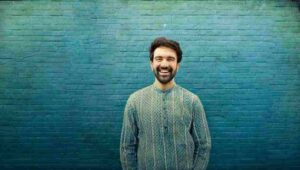
After college, Mamdani moved back to New York and took a job that would profoundly shape his political priorities: working as a foreclosure prevention and housing counselor. In this role, he assisted low-income homeowners of color across Queens facing eviction, helping them negotiate with banks to stay in their homes. It was grueling, often heartbreaking work that brought him face-to-face with the human consequences of the 2008 financial crisis and the predatory lending practices that had devastated communities of color.
“After having spent every day negotiating with banks that valued profits over people,” Mamdani later reflected, “he came face-to-face with the reality that this housing crisis—one which predated this pandemic—was not natural to our lives, but instead a choice. A choice that was the consequence of decades of pro-corporate policies enacted across our country as well as our state.”
This experience convinced Mamdani that meaningful change required political power. But before running for office himself, he cut his teeth as a campaign operative and organizer. In 2015, Mamdani volunteered for Ali Najmi’s campaign in a special election for New York City Council’s 23rd district. In 2017, having joined the New York City chapter of Democratic Socialists of America (DSA), he worked for Khader El-Yateem’s City Council campaign—El-Yateem was a Palestinian Lutheran minister and democratic socialist from Bay Ridge, Brooklyn.
Mamdani served as campaign manager for Ross Barkan’s 2018 bid for the New York State Senate, and in 2019 was a field organizer for fellow democratic socialist Tiffany Cabán’s campaign for Queens County District Attorney. Though Cabán narrowly lost, the campaign demonstrated the growing power of the DSA-backed progressive movement in New York City, buoyed by Alexandria Ocasio-Cortez’s stunning 2018 upset of powerful incumbent Joe Crowley.
It was Bernie Sanders’s 2016 presidential campaign, however, that crystallized Mamdani’s political identity. He credits Sanders with inspiring him to embrace democratic socialism explicitly. “What was so appealing about becoming a self-avowed democratic socialist and a member of the DSA in New York City is their willingness to take on things which are seen as beyond the pale,” Mamdani told Jacobin magazine in 2020. “I began my political organizing life around Palestinian solidarity, I cofounded my school’s Students for Justice in Palestine—and on that issue especially in New York, a lot of progressives are ‘Progressive Except Palestine.’ But when I got to a DSA meeting, I find that there is nothing beyond the pale.”
2020 NY State Assembly Victory: Mamdani Defeats Incumbent in Queens Primary
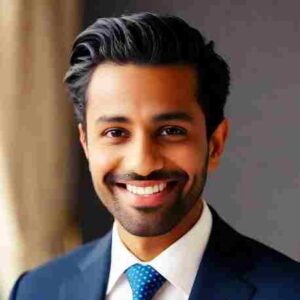
In October 2019, Mamdani announced his campaign to represent New York’s 36th State Assembly district, which encompasses Astoria and Long Island City in Queens. Running on a platform of housing reform, police and prison reform, and public ownership of utilities, Mamdani challenged incumbent Democratic Assemblymember Aravella Simotas, who had held the seat since 2011.
The campaign showcased Mamdani’s talent for grassroots organizing. Backed by the DSA and armed with an army of volunteers, his campaign knocked on thousands of doors and made countless phone calls. His slogan, “roti and roses,” was a play on the old labor movement chant “bread and roses,” with the South Asian flatbread serving as a nod to his background. The phrase encapsulated his message: that working people deserved not just bare survival, but dignity and beauty in their lives.
Mamdani’s youth, charisma, and ability to connect policy to lived experience resonated with voters frustrated by rising rents and economic insecurity. In the June 2020 Democratic primary, held amid the COVID-19 pandemic and the George Floyd protests, Mamdani defeated Simotas by a decisive margin. In the heavily Democratic district, winning the primary essentially guaranteed him the seat.
At just 28 years old, Mamdani became the first South Asian man to serve in the New York State Assembly, as well as the first Ugandan and only the third Muslim ever elected to the body. His victory was part of a small wave of DSA-backed candidates winning office that year, signaling the growing influence of democratic socialist ideas in Democratic politics.
Mamdani’s Assembly Record: Legislative Wins and Hunger Strike Activism
As an assemblymember, Mamdani’s record has been mixed. By May 2025, he had been the primary sponsor of 20 bills, of which only three became law. He co-sponsored 238 additional bills. This relatively modest legislative output is not unusual for a junior member of a large legislative body, but it became a talking point for critics who questioned his experience and effectiveness.
One of Mamdani’s most notable achievements was helping to launch a fare-free bus pilot program in New York City, demonstrating the viability of free public transit. This would later become a cornerstone of his mayoral platform. In 2021, Mamdani gained national attention by participating in a 15-day hunger strike alongside New York City taxi drivers protesting predatory loans and crushing medallion debt. The protest succeeded in securing over $450 million in debt relief for drivers—a rare example of direct action producing concrete policy wins.
Mamdani also worked to defeat a proposed dirty power plant and secured over $100 million in the state budget for increased subway service. These victories, while significant, were largely achieved through organizing and advocacy rather than legislative craftsmanship.
In the Assembly, Mamdani serves on nine committees, including Aging, Cities, Election Law, Energy, and Real Property Taxation. He is a member of the DSA’s nine-member “State Socialists in Office” bloc in New York and the Muslim Democratic Club of New York. As he told the 2023 DSA convention: “We are special as DSA electeds not because of ourselves; we are special because of our organization.”
NYC Mayor Race 2025: How Mamdani Defeated Andrew Cuomo in Democratic Primary
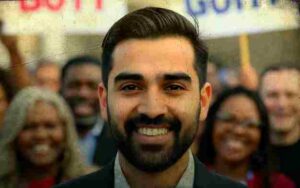
When Mamdani announced his candidacy for mayor in October 2024, few political observers gave him a realistic chance. The race was expected to be dominated by better-known figures with deeper pockets and broader name recognition. Incumbent Mayor Eric Adams, though facing federal corruption charges, was running as an independent. Andrew Cuomo, the former governor who had resigned in disgrace in 2021, had mounted a comeback bid and was widely seen as the Democratic frontrunner.
Mamdani, however, had learned from his Assembly race and from observing Alexandria Ocasio-Cortez’s playbook: grassroots organizing, social media savvy, and a relentless focus on kitchen-table economic issues could overcome institutional advantages. His campaign centered on a simple message: “I’m running to lower the cost of living for working-class New Yorkers.”
The centerpiece of his platform was a promise to “freeze the rent” for all rent-stabilized tenants in New York City—approximately one million apartments housing over two million people. This three-word slogan appeared on T-shirts, tote bags, and campaign materials across all five boroughs. In a TikTok video that went viral, Mamdani stood at Coney Island in winter, declaring “I’m freezing…” before rushing into the frigid ocean in a suit and tie, then emerging to complete the sentence: “…your rent.”
Beyond rent freezes, Mamdani proposed making public buses “fast and fare-free,” creating a network of five city-owned grocery stores (one in each borough) to provide affordable food, offering free universal childcare, and building 200,000 units of affordable housing over ten years through a new Social Housing Development Agency.
The campaign mobilized over 50,000 volunteers who knocked on 1.6 million doors—an unprecedented ground game that dwarfed his opponents’ efforts. NYC-DSA, the largest DSA chapter in the country, more than doubled in size during the campaign, growing from roughly 5,000 members to nearly 11,000. Mamdani’s message of affordability resonated across demographic lines in a city where the median rent had hit $3,700 per month and a quarter of households were spending more than half their income on housing.
On June 24, 2025, Mamdani achieved what many had deemed impossible: Andrew Cuomo conceded defeat, and Mamdani won the Democratic primary. A July 2025 poll indicated a significant shift in Jewish American political attitudes, with 43% of Jewish New Yorkers and 67% of Jewish voters under 44 planning to support Mamdani—suggesting that despite intense controversy over his Israel-Palestine positions, many Jewish voters prioritized his affordability agenda.
The victory speech at The Greats of Craft LIC in Long Island City was jubilant. With his parents Mira and Mahmood joining him on stage, Mamdani declared: “New York, we have renewed our democracy. We have given our city permission to believe again. And I pledge to you that we will remake this great city not in my image, but in the image of every New Yorker who has known only struggle. In our New York the power belongs to the people.”
Rent Freeze Policy Explained: Mamdani’s Housing Plan for NYC Renters
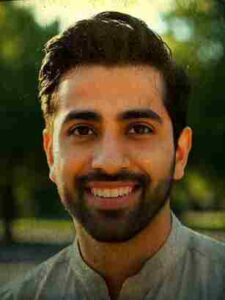
No single policy proposal has defined Mamdani’s candidacy more than his pledge to freeze rents on New York City’s nearly one million rent-stabilized apartments for four years—the duration of his mayoral term. For supporters, it represents urgently needed relief for working families crushed by housing costs. For critics, it’s an economically illiterate policy that would devastate the housing market and hurt the very people it’s meant to help.
The mechanics of Mamdani’s proposal involve the Rent Guidelines Board (RGB), an independent administrative body that sets annual rent increases for stabilized units. While the mayor cannot directly control rent levels, the RGB’s nine members are all mayoral appointees. Mamdani has pledged to appoint board members committed to voting for zero percent increases every year.
Tenant advocates estimate that a four-year freeze could save renters $6.8 billion over that period. Cea Weaver, Executive Director of Housing Justice for All, argues that “tenants are the majority in New York. Hundreds of thousands of us united to elect Zohran Mamdani because he had an answer to address our biggest expense every month: rent.” Supporters point out that landlords of stabilized units saw their average income (after expenses and adjusted for inflation) rise by 8% between 2022 and 2023, according to RGB data, suggesting they can absorb a freeze.
Economic Concerns About NYC Rent Control Freeze
The criticisms, however, are substantial and come from across the political and economic spectrum. Legal scholars argue that Mamdani’s explicit pledge undermines the RGB’s independence and due process requirements. Christian Browne, writing in City Journal, notes that “board members are not permitted to make such overt or implied promises” and that New York’s Court of Appeals has made clear that “an impartial decision maker is a core guarantee of due process.” By promising a predetermined outcome before the board even reviews evidence, Mamdani may be setting up his policy for legal challenge.
Economists warn that rent freezes create perverse incentives. E.J. Antoni of the Heritage Foundation states: “Economists—whether they are on the right or on the left—essentially are in universal agreement, that when the government implements price controls in the rental market, you end up with housing shortages.” Emily Hamilton of George Mason University’s Mercatus Center adds: “It’s going to exacerbate the city’s housing quality problems that the current rent stabilization law is already exacerbating.”
The concern centers on maintenance and investment. Rent-stabilized buildings, many of which are owned by small “mom-and-pop” landlords, rely on rent revenue to cover rising property taxes, insurance costs, and building maintenance. A 2019 state law already eliminated most mechanisms that allowed landlords to raise rents to cover improvements or when tenants moved out. Mark Willis of NYU’s Furman Center testified to the RGB that owners of rent-stabilized properties in the Bronx are losing an average of $120 per month on every apartment, leaving 200,000 units under “severe distress.”
One Brooklyn landlord, Ebony Hannibal, exemplifies the bind many small property owners face. She owns a four-unit building and struggles to make her $3,800 monthly mortgage while pursuing tenants who collectively owe nearly $100,000 in back rent. “If Mamdani’s freeze becomes reality,” she told The Wall Street Journal, “she plans to sell her building.” But, as observers note, who would buy a building where rents don’t cover costs?
Historical Precedent: NYC Rent Control in the 1970s
The historical precedent is not encouraging. During Mayor Bill de Blasio’s tenure (2014-2022), when the RGB never approved increases above 1.5% and froze rents three times, the federal Census Bureau found “a higher prevalence of most individual maintenance deficiencies relative to earlier cycles.” Even as overall housing supply increased, the city saw “a continued net loss of the lowest-cost units and a net increase of higher-cost units”—suggesting that rent suppression on stabilized units leads developers to focus on luxury housing not subject to regulation.
There’s also concern about equity. Rent stabilization covers only about 40% of rental units, with the rest subject to market rates. Fernando Burgos, a housing policy analyst, argues: “Freezing rents for 40 percent of tenants is not a solution to affordability. It is picking winners and losers. The consequences of the policy will be an increase in overall rents for most tenants, less housing as private capital is reluctant to invest, and ultimately budget shortfalls that put the city’s social safety net at risk.”
Some warn of a return to 1970s-era housing abandonment, when landlords in the South Bronx, unable to cover costs due to rent controls and other factors, simply walked away from buildings or even committed arson to collect insurance payouts. The prospect seems extreme, but the underlying dynamic—buildings becoming more valuable empty than occupied—could reemerge if operating costs continue rising while rent revenues are frozen.
Mamdani has acknowledged these concerns but argues they’re overblown. He points to his broader housing plan, which includes doubling funding for the city Housing Authority, building 200,000 new affordable units, and targeted assistance for landlords who genuinely cannot cover costs. “Increasing the supply of housing accessible to middle- and working-class New Yorkers is ultimately the best way to stem the affordability crisis,” his campaign acknowledges. “But we also need more immediate relief.”
City-Owned Grocery Stores NYC: Mamdani’s Public Supermarket Proposal
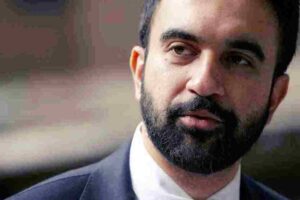
Mamdani’s proposal to create a network of five city-owned grocery stores—one in each borough—has sparked nearly as much controversy as his rent freeze. The proposal reflects his belief that government should directly provide essential services rather than rely solely on private markets, especially in underserved communities.
The logic, as Mamdani explains it, is straightforward. Private grocery stores must turn a profit, which requires marking up goods. City-owned stores, by contrast, would not need to pay rent or property taxes, would not need to turn a profit, and could “buy and sell at wholesale prices, centralize warehousing and distribution, and partner with local neighborhoods on products and sourcing.” The estimated cost: $60 million for five stores.
Mamdani argues this represents better value than the city’s existing Food Retail Expansion to Support Health (FRESH) program, which provides tax breaks to private grocers opening in food deserts. However, critics quickly identified a fundamental error in his math. Mamdani claimed the city was “set to spend $140 million” on FRESH, which he would redirect to his city-owned stores. In reality, as the Washington Examiner’s Timothy Carney discovered, that $140 million represents private investment by grocery stores, not city spending. The actual cost to the city in foregone tax revenue is about $3.3 million annually—meaning it would take 42 years to reach $140 million.
Criticism of Government-Run Supermarkets in NYC
This accounting error raised questions about Mamdani’s grasp of economic policy and his campaign’s vetting process. But beyond the math, economists and business leaders have raised substantive concerns about the viability of government-run grocery stores.
Ryan Bourne of the Cato Institute calls the proposal “the height of political hubris,” noting that “government-run entities have no market discipline—no need to earn profits, compete, or serve customers efficiently. That leads to bloated costs, empty shelves, and zero accountability.” The grocery business operates on notoriously thin margins of 1-2%, relying on sophisticated supply chains, economies of scale, and constant optimization to remain viable. Scott Lincicome, also of Cato, asks pointedly: “Can New York City bureaucrats really run grocery stores at a lower cost than highly capitalized private firms enjoying massive economies of scale, decades of market experience, and complex supply chains?”
Billionaire grocery owner John Catsimatidis, who operates the Gristedes and D’Agostino chains in Manhattan, has been one of the most vocal critics, threatening to close or relocate his stores if Mamdani wins. “If the city of New York is going socialist, I will definitely close, or sell, or move or franchise the Gristedes locations,” he declared, comparing Mamdani to Fidel Castro and Hugo Chavez. (Catsimatidis, a major Republican donor and two-time GOP mayoral candidate, may not be entirely disinterested in his opposition.)
Municipal Grocery Store Examples Across America
Yet the proposal is not as radical as critics portray. Government-owned or subsidized grocery stores already exist in the United States. The Department of Defense operates commissaries for military personnel that offer groceries at cost. St. Paul, Kansas—a town of about 600 people—operates the only grocery store for miles around after private operators left. Atlanta is opening two municipal grocery stores after struggling to attract private chains to underserved neighborhoods. Madison, Wisconsin and rural Venice, Illinois have similar plans.
“This is more common than people are aware of,” says Nevin Cohen, director of CUNY’s Urban Food Policy Institute. “There’s a wide spectrum of food retail establishments that could be created by or with the support of city government.”
Some experts who might otherwise support public groceries warn that New York City’s proposal may not be ambitious enough. The challenge facing independent grocers—whether publicly or privately owned—is market consolidation. Major chains like Walmart can negotiate much lower wholesale prices due to their massive scale, making it difficult for smaller operators to compete. Claire Kelloway of the Open Markets Institute notes that “Walmart specifically precipitated this big change in grocery competition.”
The Robinson-Patman Act, passed in 1936, was designed to prevent such price discrimination, but it has rarely been enforced in recent decades. Some advocates argue that New York City, with its massive purchasing power, could use the leverage of city government to demand fair wholesale pricing and even push for renewed Robinson-Patman enforcement—turning the grocery proposal into a tool for broader market reform rather than just five isolated stores.
Daniel Di Martino, a fellow at the Manhattan Institute who grew up in Venezuela, offers a cautionary tale based on personal experience. Government-owned grocery stores there “were subject to extensive corruption by government officials that awarded contracts to friends, they sold rotten or low quality food, and they served as a way to make voters dependent on the government and force them to vote for the socialist leaders.”
The question remains: If city-owned grocery stores would have empty shelves and poor quality as critics claim, why would anyone shop there instead of at private alternatives? And if they wouldn’t attract customers, how could they threaten private grocers? Conversely, if they would be successful and efficient, doesn’t that validate the model? Critics seem to want it both ways, suggesting both that the stores would be disastrous failures and that they would somehow destroy the entire private grocery sector.
Ultimately, Mamdani’s grocery proposal reveals both the appeal and the challenges of his democratic socialist approach. His instinct to address market failures through public provision resonates with voters frustrated by corporate power and disappearing neighborhood services. But the execution details remain vague, the cost estimates questionable, and the economic analysis thin.
Zohran Mamdani Israel Palestine Stance: BDS Support and Antisemitism Controversy
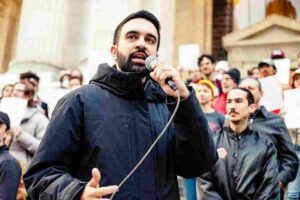
Perhaps no issue has generated more controversy around Mamdani’s candidacy than his long-standing advocacy for Palestinian rights and criticism of Israel. For Mamdani, who has called the Palestinian cause “central to my identity,” his positions reflect principles of anti-colonialism and universal human rights. For many Jewish New Yorkers and pro-Israel advocates, his rhetoric crosses lines into antisemitism or, at minimum, demonstrates a concerning inability to recognize when anti-Zionism becomes anti-Jewish prejudice.
Mamdani’s involvement with Palestinian activism began at Bowdoin, where he co-founded the Students for Justice in Palestine chapter. In 2014, he supported the American Studies Association’s boycott of Israeli academic institutions, arguing that “Israeli universities are both actively and passively complicit in the crimes of both the Israeli military and the Israeli government in all its settler-colonial forms.” He has consistently supported the BDS movement throughout his adult life, a stance that pro-Israel groups argue seeks the eradication of Israel as a Jewish state.
Does Mamdani Support Israel’s Right to Exist as Jewish State?
As an assemblymember and mayoral candidate, Mamdani has faced intense scrutiny over his positions on Israel. He has stated that “Israel has a right to exist” but consistently qualifies this by adding that Israel is “flouting its responsibilities under international law.” When pressed about whether Israel has a right to exist as a Jewish state, Mamdani has been unequivocal: “I’m not comfortable supporting any state that has a hierarchy of citizenship on the basis of religion or anything else. Equality should be enshrined in every country in the world.”
This position places Mamdani outside the mainstream of American Jewish opinion, where support for Israel as a specifically Jewish state is near-universal. Critics note that Mamdani does not express similar concerns about the dozens of Muslim-majority nations or the various ethnic nation-states around the world, suggesting a double standard applied uniquely to Jews.
“Globalize the Intifada” Slogan: Mamdani’s Response to Jewish Concerns
The controversy intensified around the phrase “globalize the intifada.” While Mamdani has never personally used the phrase, he has repeatedly declined to condemn it when asked. In an interview with The Bulwark, he said the slogan captured “a desperate desire for equality and equal rights in standing up for Palestinian human rights” and noted that the U.S. Holocaust Museum had used the word “intifada” in Arabic-language descriptions of the 1943 Warsaw Ghetto Uprising.
For many Jews, this refusal to condemn was deeply troubling. The word “intifada” is inextricably linked to two Palestinian uprisings (1987-1993 and 2000-2005) marked by bus bombings, suicide attacks, and other violence that killed over 1,000 Israeli civilians. Rep. Dan Goldman stated: “If Mr. Mamdani is unwilling to heed the request of major Jewish organizations to condemn this unquestionably antisemitic phrase, then he is unfit to lead a city with 1.3 million Jews—the largest Jewish population outside of Israel.”
Jonathan Greenblatt of the Anti-Defamation League called the phrase “explicit incitement to violence.” Rep. Hakeem Jeffries, the House Democratic leader, refused to endorse Mamdani and insisted he would “have to clarify his position” on the phrase.
Mamdani’s October 7 Hamas Attack Statement and Gaza War Position
On October 7-8, 2023, some members of NYC-DSA celebrated Hamas’s terror attack at a Times Square rally, prompting Mamdani to issue a statement on October 10: “My support for Palestinian liberation should never be confused for a celebration of the loss of civilian life. I condemn the killing of civilians and rhetoric at a rally seeking to make light of such deaths.” On the second anniversary of the October 7 attack, Mamdani issued a more extensive statement mourning those killed by Hamas, calling it a “horrific war crime,” while also condemning Israel’s military response in Gaza, which he characterized as genocide. “The occupation and apartheid must end,” he wrote. “Peace must be pursued through diplomacy, not war crimes.”
Mamdani’s use of the term “genocide” to describe Israel’s actions in Gaza has drawn sharp criticism. The American Jewish Committee argues that this charge is “unequivocally false and dangerous, has not been proven in any international court, and gives fodder to those who continue to use Israel’s self-defensive actions as an excuse to threaten and attack Jews.” They note that Israel issues evacuation warnings, opens humanitarian corridors, and works to get aid into Gaza—actions inconsistent with genocidal intent.
When pressed during a Fox News interview, Mamdani refused to explicitly condemn Hamas or agree that it should disarm, stating only that “the role of the mayor is not to police language.” This stance troubled many observers who note that Hamas continues to call for the annihilation of Israel and violence against Jews, and has executed more than 30 Palestinians in Gaza. The AJC argues that “It should not be difficult to clearly and consistently condemn this terror organization.”
Jewish Community Support for Mamdani NYC Mayor Campaign
Yet Mamdani has also taken steps to address Jewish concerns about antisemitism. He has condemned antisemitic violence, including a shooting outside the Capital Jewish Museum that killed two Israeli embassy employees and an attack on a synagogue in England. “My thoughts are with the victims and their families,” he wrote after the museum shooting, “as well as all those who must contend with the appalling rise in antisemitic violence.”
In a June appearance on The Bulwark Podcast, Mamdani spoke movingly about antisemitism: “You know, just a few days after the horrific war crime of October 7, a friend of mine told me about how he went to his synagogue for Shabbat services, and he heard the door open behind him, and a tremor went up his spine as he turned around, not knowing who was there and what they meant for him. I spoke to a Jewish man in Williamsburg just months ago who told me that the door he left unlocked for decades is now one that he locks. And ultimately, this is because we’re seeing a crisis of antisemitism.”
Mamdani has pledged to appoint a senior adviser to tackle antisemitism if elected mayor, promised to protect Jewish New Yorkers’ right to worship safely, and said he would not defund the annual Israel Day Parade (though critics note the inconsistency of supporting BDS while permitting a parade celebrating Israel). He has engaged in good-faith dialogue with Jewish communities ranging from Haredi to liberal congregations.
Notably, some prominent Jewish New Yorkers have defended Mamdani. Journalist Jay Michaelson wrote an op-ed titled “Jews are worried about Zohran Mamdani. Here’s why they shouldn’t be,” arguing there’s no evidence Mamdani is antisemitic and noting he’s been endorsed by prominent Jewish New Yorkers. Rabbi Sharon Kleinbaum of Congregation Beit Simchat Torah has engaged constructively with Mamdani. Jewish leftist organization Jews for Racial and Economic Justice (JFREJ) knocked on 4,000 doors in support of his campaign.
Sophie Ellman-Golan of JFREJ argues: “A lot of the fear-mongering and smears we’ve seen about Zohran do not square with the person we know him to be and frankly, don’t square with what he has actually said on the record.” She emphasizes the need to “not conflate Israel and Jews.”
The July 2025 poll showing 43% of Jewish New Yorkers and 67% of Jewish voters under 44 planning to support Mamdani suggests a generational divide, with younger Jews more critical of Israeli government policies and more willing to prioritize domestic issues like affordability over Middle East politics.
Yet significant concerns remain. Over 650 U.S. rabbis signed a letter opposing Mamdani and “the political normalization of anti-Zionism.” The question for many Jewish voters is whether Mamdani, given his lifelong pro-Palestinian activism, can be trusted to recognize when criticism of Israel crosses into antisemitism—particularly left-wing antisemitism, which often manifests as targeting Jewish institutions under the guise of protesting Israel.
His inconsistencies add to these concerns: he supports BDS but promises not to defund the Israel Day Parade; he calls Palestinian rights “central to his identity” yet says he’ll have Zionists in his administration; he criticizes “Progressive Except Palestine” attitudes yet pledges to protect Jewish safety. As one Forward op-ed put it: “Which of those apparently opposed positions should [Jewish voters] believe represents his actual intention?”
For Mamdani’s mayoral prospects, the Israel-Palestine controversy represents both a challenge and an opportunity. It energizes much of his progressive base while making him toxic to some Jewish voters. Yet his ability to navigate these treacherous waters while maintaining a lead in the polls suggests that many New Yorkers—including a substantial minority of Jewish New Yorkers—are willing to prioritize his affordability agenda over Middle East politics.
Mamdani Campaign Controversies: Privilege, Experience, and Identity Questions
Beyond the major policy debates, several other controversies have dogged Mamdani’s campaign:
Rent-Stabilized Apartment Controversy
Privilege and Hypocrisy: Mamdani has faced criticism for occupying a rent-stabilized apartment in Astoria while running on a populist platform. Mayor Eric Adams charged that “it is outrageous that a man who presents himself as a champion of the poor would occupy an apartment intended for public housing while thousands of New Yorkers sleep in shelters or on the streets.” Andrew Cuomo added: “Somewhere last night in New York City, a single mother and her children slept at a homeless shelter because you, Assemblyman Zohran Mamdani, are occupying her rent-controlled apartment.”
Mamdani has also acknowledged that his political activism was only possible because of family wealth. “I worked until January, and then I took time away from my job, and one of the major reasons I could do that was because I knew that if I ran out of my savings, my family would be able to support me.” This admission of privilege has undercut his working-class champion image for some critics.
Mamdani’s Limited Legislative Experience for NYC Mayor
Limited Experience: With only four years in the Assembly and limited legislative accomplishments, questions about Mamdani’s readiness for executive office persist. He would be managing a city budget of over $100 billion, overseeing 300,000+ employees, and navigating complex labor negotiations, federal relations, and crisis management. His supporters argue that executive competence matters less than political will and that establishment “experience” has produced the current dysfunctional status quo.
George Soros Funding and DSA Support
Organizational Support and Funding: Conservative media has highlighted Mamdani’s connections to organizations funded by George Soros, noting that groups like MPower Change and Emgage—which have supported Muslim political organizing including Mamdani’s campaigns—have received nearly $2.5 million from Soros’s foundations. Critics portray this as evidence of a coordinated effort to engineer his rise to power, while supporters note that Soros funds hundreds of civil society organizations supporting democratic participation.
Is Mamdani Communist or Democratic Socialist?
Communist or Democratic Socialist?: President Donald Trump called Mamdani “a 100% Communist Lunatic,” while other conservatives have labeled him a communist rather than merely a democratic socialist. Fact-checkers note that Mamdani explicitly identifies as a democratic socialist, supports electoral democracy, and proposes policies like public housing and fare-free transit that exist in many capitalist democracies. His platform, while ambitious, does not call for abolishing private property, nationalizing all industries, or eliminating market mechanisms—the hallmarks of communism.
Mamdani’s African American Identity Controversy
Identity Questions: A controversy emerged when Mamdani identified as “Black or African American” on a college application despite being of Indian descent. Mamdani explained to The New York Times that he identifies as “an American who was born in Africa,” noting his Ugandan roots. Critics saw this as opportunistic appropriation of African-American identity for advantage, while defenders noted the complexity of racial categorization for someone with his background.
What is Democratic Socialism? Mamdani’s Political Philosophy Explained
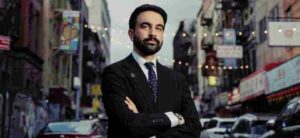
Understanding Mamdani requires grappling with what he means by “democratic socialism.” He has cited as influences Bernie Sanders, early 20th-century “sewer socialists” like Milwaukee mayors Daniel Hoan and Victor L. Berger, populist mayor Fiorello La Guardia, and contemporary leaders like Boston mayor Michelle Wu and Baltimore mayor Brandon Scott.
In a 2020 interview with Jacobin, Mamdani explained: “To be a democratic socialist means that you are committed to the state providing for people that which is necessary to live a dignified life. Because if you are dedicated to that vision of a society, and that is your true aim as a legislator and organizer, then you are far more willing to go up against the powers that be that will throw obstacles in your way.”
This vision centers on decommodifying basic needs—housing, transportation, food, healthcare, childcare—so that access does not depend on ability to pay. It views many social problems not as natural or inevitable but as the result of political choices that prioritize corporate profits over human welfare. It embraces robust government intervention in markets, public ownership of key services, and redistribution of wealth and power.
Crucially for Mamdani, democratic socialism is distinguished from mere progressivism by its willingness to fundamentally challenge capitalism rather than simply regulate its worst excesses. “There are many fights where democratic socialists and self-described progressives will be on the exact same side,” he acknowledges. “There are times, though, when there will be division and you always need organizers who are willing to expand the political imagination beyond what is considered acceptable.”
He often praises Boston Mayor Michelle Wu, calling her “the most effective current Democratic politician” for policies like fare-free public transit that inspired his own proposals. His campaign’s focus on material conditions—rent, transit fares, grocery costs, childcare—reflects a Marxist-influenced analysis that economic relations fundamentally shape society and that improving people’s material lives is the path to broader transformation.
NYC Mayoral Election 2025: Mamdani vs. Adams, Sliwa, and Cuomo
As of late October 2025, Mamdani leads in polls for the November general election, facing Republican candidate Curtis Sliwa and independent candidates Eric Adams and potentially Andrew Cuomo. His grassroots organization remains formidable, and his message continues to resonate. Yet significant challenges remain.
Wall Street and the business community have mobilized against him. Billionaire hedge fund manager Bill Ackman has pledged to finance an alternative candidate. Major corporations and real estate interests view his policies as existential threats. The attacks will intensify.
Mamdani will need to demonstrate executive competence and policy sophistication beyond catchy slogans. His accounting error on grocery stores, legal questions about his rent freeze, and vague implementation details have provided ammunition to critics. He’ll need to build coalitions beyond his progressive base, reassure moderate voters, and prove he can actually govern a complex city rather than simply organize campaigns.
The Israel-Palestine controversy will continue to dog him, requiring a careful balance between his principles and the concerns of a significant constituency. His handling of antisemitism—both recognizing and combating it—will be closely watched.
If elected, Mamdani would face immediate tests: appointing competent department heads, managing the city’s fiscal challenges, working with a state legislature that may not share his vision, and navigating complex labor negotiations. His rent freeze would likely face legal challenges. His grocery stores would need detailed planning and execution. His housing construction goals would require navigating Byzantine zoning laws and development processes.
Yet his election would also represent something historic: validation that democratic socialist ideas can win at the highest levels of American politics, that grassroots organizing can overcome establishment power and money, and that younger, more diverse voters are reshaping the Democratic Party. If successful, he could inspire similar movements in other cities.
Conclusion: Can Democratic Socialist Zohran Mamdani Govern NYC?
Zohran Mamdani represents the contradictions and possibilities of American progressive politics in the 2020s. He is simultaneously a privileged child of famous parents and a housing counselor who witnessed foreclosures firsthand. He is a naturalized American who grew up speaking Hindustani at home and a savvy social media operator who makes policy fun through viral videos. He is a democratic socialist running in America’s capital of capitalism, a critic of American imperialism seeking to lead a global city, and a champion of the working class with family wealth and an Ivy League education in his background.
His policy proposals reflect both genuine attempts to address real problems—crushing housing costs, inadequate public transit, food insecurity—and the limitations of translating socialist theory into concrete governance. His rent freeze addresses tenant desperation but ignores market dynamics and unintended consequences. His grocery stores respond to corporate consolidation but rest on questionable economics. His housing construction goals are ambitious but underspecified.
His evolution on Israel-Palestine reveals the challenges of maintaining ideological commitments while building broad coalitions. His refusal to condemn “globalize the intifada” while condemning antisemitic violence, his support for BDS while promising to protect the Israel Day Parade, his characterization of Israel’s actions as genocide while mourning Hamas’s “horrific war crime”—all reflect a politician trying to maintain progressive bona fides while not alienating crucial constituencies.
Whether Mamdani’s moment represents a genuine realignment of urban politics or merely a protest vote against establishment failure remains to be seen. His success in mobilizing volunteers, winning over diverse voters, and making socialism mainstream conversation in America’s largest city is undeniable. Whether he can actually govern effectively, implement his agenda, and improve New Yorkers’ lives will determine his ultimate legacy.
For now, the 33-year-old Ugandan-born, Indian-descended, Bronx Science-educated, Bowdoin-graduated, Assembly-elected, DSA-endorsed, housing counselor-turned-politician stands on the precipice of making history. On November 4, 2025, New Yorkers will decide whether his vision of democratic socialism represents the city’s future—or a detour into ideological fantasy that the nation’s largest metropolis cannot afford.